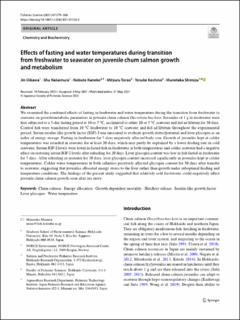Effects of fasting and water temperatures during transition from freshwater to seawater on juvenile chum salmon growth and metabolism
Journal article, Peer reviewed
Published version
Permanent lenke
https://hdl.handle.net/11250/2834097Utgivelsesdato
2021Metadata
Vis full innførselSamlinger
Sammendrag
We examined the combined effects of fasting in freshwater and water temperature during the transition from freshwater to seawater on growth/metabolic parameters in juvenile chum salmon Oncorhynchus keta. Juveniles of 1 g in freshwater were first subjected to a 5-day fasting period at 10 or 5 °C, acclimated to either 10 or 5 °C seawater and fed ad libitum for 30 days. Control fish were transferred from 10 °C freshwater to 10 °C seawater and fed ad libitum throughout the experimental period. Serum insulin-like growth factor (IGF)-I was measured to evaluate growth status/potential and liver glycogen as an index of energy storage. Fasting in freshwater for 5 days negatively affected body size. Growth of juveniles kept at colder temperatures was retarded in seawater for at least 20 days, which may partly be explained by a lower feeding rate in cold seawater. Serum IGF-I levels were lower in fasted fish in freshwater at both temperatures and colder seawater had a negative effect on restoring serum IGF-I levels after refeeding for 20 days. Liver glycogen content was low in fish fasted in freshwater for 5 days. After refeeding in seawater for 10 days, liver glycogen content increased significantly in juveniles kept at colder temperatures. Colder water temperatures in both salinities positively affected glycogen content for 30 days after transfer to seawater, suggesting that juveniles allocated energy stores to the liver rather than growth under suboptimal feeding and temperature conditions. The findings of the present study suggested that relatively cold freshwater could negatively affect juvenile chum salmon growth soon after sea entry.

